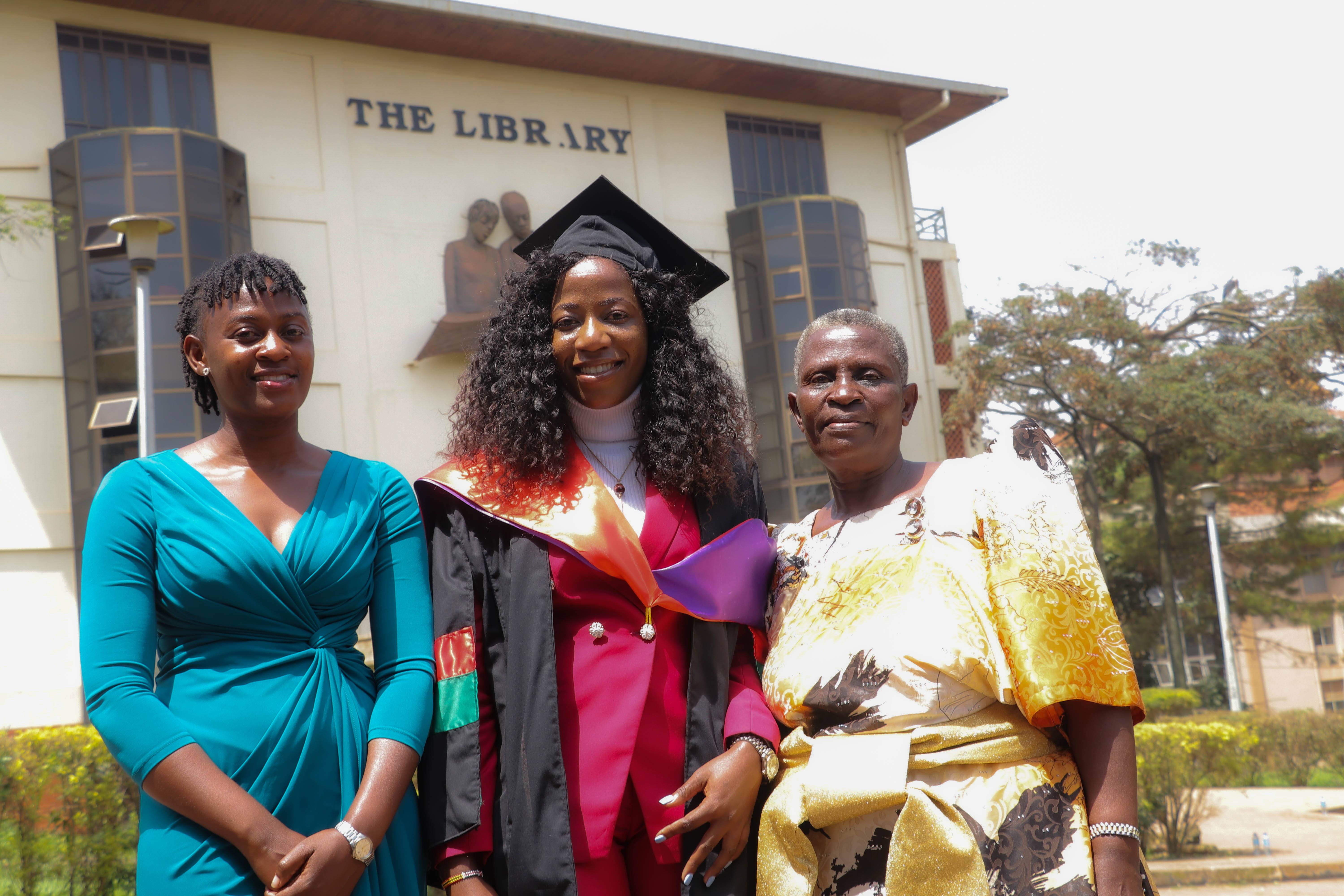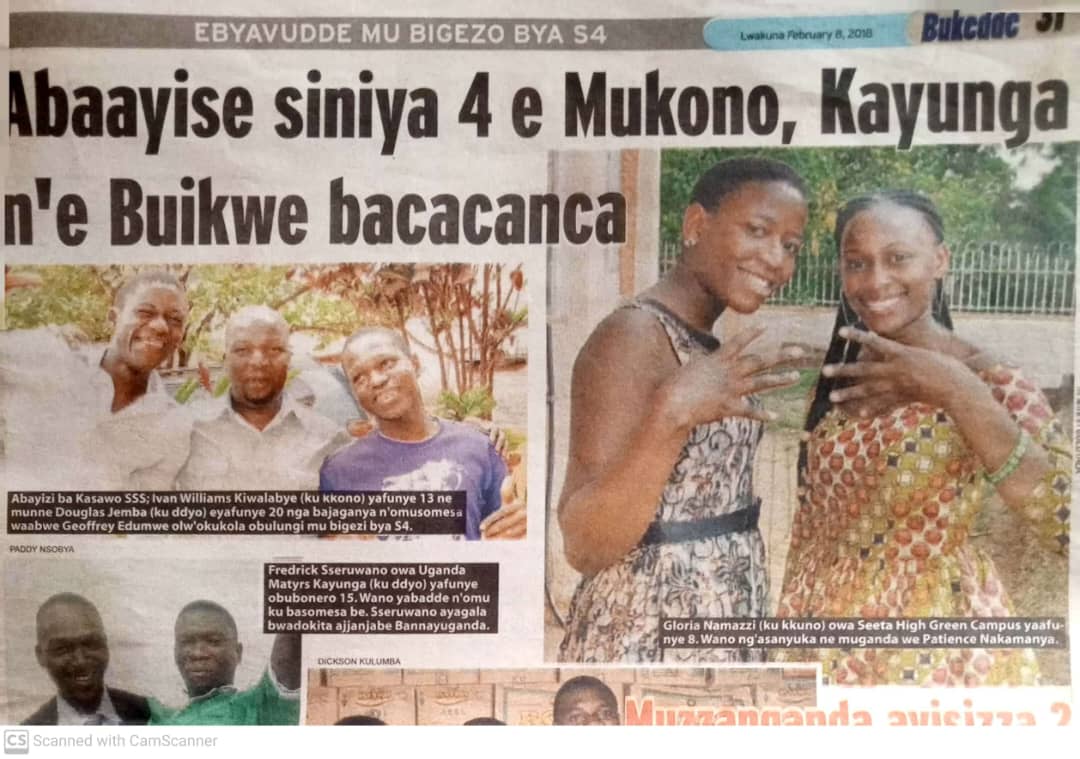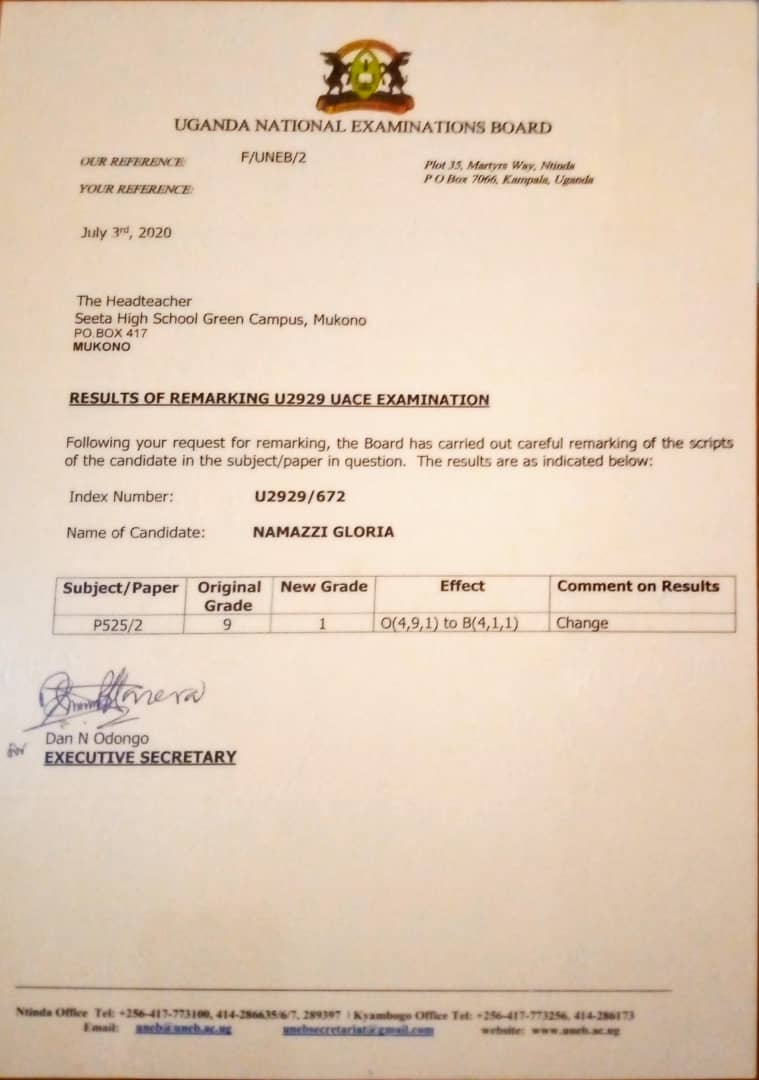
The road that Gloria Namazzi now walks was not laid with silver spoons but with the blood, sweat, and tears of her forebears. She was born into a strong, resilient family. Gloria grew up helping her big family with farming in Kiryasaaka Parish, Misanvu Village, Bukomansimbi district (which used to be called greater Masaka district). Gloria's Anglican parents taught her from a young age how important it is to keep going and work hard. Their lives were based around coffee farming and subsistence farming. No matter how hard it was financially, she kept studying with determination.
Growing up in a rural family—her father, the late Livingstone Mpimbe, and mother, Ms. Rosemary Nabanoba—instilled in Gloria a strong work ethic and a can-do attitude. Gloria is the lastborn of fifteen children—ten on her mother's side and fourteen on her father's—but she grew up in an environment where everyone pitched in and helped out.
A few weeks ago, she topped the Bachelor of Environmental Health Science graduating class of #Mak74thGrad with a Cumulative Grade Point Average (CGPA) of 4.55 out of 5.00, earning First Class Honors and securing a spot on the Vice Chancellor’s List. Following the tradition at Makerere University School of Public Health (MakSPH), she receives an award for her meritorious completion by the Vice Chancellor, Prof. Barnabas Nawangwe.

Resplendent in her graduation gown and cap, Gloria Namazzi was this weekend, down in Bukomansimbi, surrounded by family, friends, and neighbors, their faces beaming with pride and admiration. The vibrant sounds of a local band filled the air in Misanvu village, beckoning everyone to the lively festivities that awaited. It was the graduation of their brightest star, filled with love, laughter, and an overwhelming sense of community spirit.
Her journey through education began at Aunt Rebecca Primary School, a humble institution where her academic prowess quickly became evident. With her exceptional performance, she emerged as the top student in her Primary Leaving Examinations (PLE), laying the foundation for her future endeavors.
“I went to Aunt Rebecca Primary School from the time I was in Baby Class until I completed P7 (from 2004 to 2013). While most of my siblings and I started our education there, many of my brothers continued their schooling elsewhere after primary, opting for schools in towns like Masaka and Kampala. Aunt Rebecca Primary School was conveniently located in Misanvu trading center, some-distance away from home. I have fond memories of my early days there, sometimes being driven to school on a boda or carried by my brothers,” said Namazzi.
Adding that; “We had to travel a considerable distance to attend a different PLE school in Kilyasaaka since our own school did not have a UNEB Center Number when we reached Primary seven (P.7). I was the best student at Kiryasaaka Primary School, where I obtained 9 aggregates.”
But there would be obstacles along the way. As a family, Gloria's dreams were in jeopardy due to financial difficulties, which became more acute following her father's death. Her resolute will and unyielding soul, however, would not give in to hardship.
“I was supposed to start at Seeta High School for my first year of secondary school. However, my dad's health deteriorated rapidly due to chronic illnesses. He was diabetic and hypertensive. As a result, our family faced financial struggles, especially since my dad couldn't manage our coffee farm as before. With money dwindling and my mom unable to cover the expenses alone, I had to delay reporting for school in Senior One by about a month and a half, while other students had already begun their classes,” recollects Namazzi.
Adding that; “I joined my sisters at Mbalala Secondary School. Georgina Nanyunja worked as a nurse, and Miriam Ndagano was a teacher there. They understood my family's situation because my mom had shared with them. But when they visited our village for a burial and learned of my predicament, they decided to take me along with them.”
After about one and a half months of being out of school, her elder siblings decided to enrol her in their school. Here, they covered her fees, and she attended from Senior One to Senior Two, second term. However, her mother was restless. She wanted her daughter to attend Seeta High School, to study apparently with children of affluent families for career and future connections.
“She [her mother] eventually took me there [Seeta High School] during Senior Two, second term, paying my fees. She wanted us all in the same school, where my sister and brother also studied. This switch happened three weeks into the term. Initially, things were okay. But by the time I reached Senior Three, financial difficulties set in, and this time it was worse. Despite often reporting to school after prolonged absences—sometimes as long as one and a half months—I managed to maintain good academic performance,” Namazzi recalls.
Against the odds, Gloria pressed on, and her resilience shone brightly during her secondary education, where she encountered setbacks but emerged stronger each time. Her mother was involved in an accident during the third term of her senior year, when she was transitioning to Form Four. She was riding a boda in Masaka when she was hit by a trailer. Fortunately, she lived, but her legs were severely injured and required significant therapy.
She was supposed to go on a field trip to Kasese at the moment, but she hadn't paid; this accident meant she didn't even bother to ask because she could tell her mother was having financial difficulties. Meanwhile, her father's chronic diseases necessitated costly medical treatments. With her brother also in university, money was difficult, especially for school expenses, as all three of them were still in school.
“I stayed home for about a month and a half, taking care of my mother. It was tight—there was no money at all. Eventually, when my mom's health improved somewhat, she went to school and explained the situation. The teachers, who had always been fond of me, were surprised and said they would have allowed me to attend earlier if they had known. They were so supportive that they let me return to school without paying a single penny, even though back then, they only admitted students with fully paid fees,” says Namazzi.

Finding BRAC Uganda sponsorship
The pursuit of higher education saw Gloria charting uncharted territories, fuelled by her passion for learning and a desire to make a difference. Despite financial constraints, she found solace in the support of organizations like BRAC Uganda, a prominent NGO providing education to underserved communities whose scholarship paved the way for her to pursue a Bachelor of Environmental Health Science.
“When I joined, my class was finishing up mid-term exams, so I had to catch up on notes and papers. Noticing this, Mr. Ssebukalu Boniface, the Director of Studies offered to photocopy all the notes for me. With his help, I studied hard and ended up ranking third in the class during the end-of-term exams. The teachers were impressed, considering I had joined late,” she said.
Because of her financial struggles, the school administration encouraged Gloria to apply for a scholarship from BRAC Uganda. “Mr. Joseph Kamya, a teacher who was my friend guided me through the process. Although it took a while, I eventually secured the scholarship starting from Form Four. With BRAC's support, I didn't have to worry about expenses anymore.”
Death of her father and scoring 8 in 8 at UCE
In the face of profound loss, resilience becomes a beacon of hope, guiding us through the darkest of times. For Gloria Namazzi, the sudden passing of her father cast a shadow over her journey, yet her unwavering determination illuminated her path forward.
“In the first term of Senior Four, just as I was settling back into school, I received the news that my father had passed away. This really broke me. I felt like the world was crumbling on me. I could cry at every thought of him and that was now fatherless. Reality soon set in and I had to concentrate on my books because this is the only way I would make mum proud,” she said.
Namazzi emerged from the depths of grief with strength that defied all odds. With determination as her ally, she triumphed academically, achieving an impressive 8 aggregates in her Senior Four exams, topping the School. “It was a tough time, but I persevered and completed Senior Four with 8 aggregates. I was very excited. My family too. I had made my mother and late dad proud. This was my first time to appear in the newspapers and I received an award from the school. I decided to continue my education at Seeta High School, Green Campus, from Form Five to Form Six.”

After her dad passed away, his coffee farm was taken over by a company under the pretext of a five-year contract. This left them financially strained, as they no longer received sufficient income from the farm. Instead, they had to borrow money from the company to cover their expenses, accruing debts in the process. However, ownership of the farm has since reverted to the family, and they now manage it themselves. Occasionally, Namazzi would contact her brother, the rightful heir, to negotiate loans from the company, supplementing it with whatever funds in case she could contribute for urgent needs.
Gloria Rejects UNEB F9 Score in Chemistry, Clings to Hope
The Uganda Certificate of Education (UCE) and Advanced Certificate (UACE) are based on the original British 'O' and 'A'-level models. For UACE, students select a combination of three Principal subjects. Mathematics, Chemistry and Biology were Gloria Namazzi’s principal subjects plus General Paper and Subsidiary Computer in the Uganda Advanced Certificate of Education (UACE) also known colloquially as "A-Level"
The Uganda National Examinations Board (UNEB), the country's official testing body, sent Namazzi a result slip that showed she had gotten a Principal Pass (B) in math, a Principal Pass (C) in biology, and a Subsidiary in chemistry (O). This surprised her. Namazzi had been feeling good about the Chemistry examination, but this score didn't make her feel that way. This feel was shared by her teachers too.
“I knew I was good at chemistry. When I saw the F9 score, I was sure I deserved better. I finished the paper (chemistry paper two) feeling confident, expecting a D1. In this paper, we would choose four out of five questions. It was devastating; I cried and didn't want to talk to anyone,” she says.
Still downcast in Bukomansimbi, the miraculous money equivalent to Shs. 500,000, which as sufficient to apply for a remark from UNEB come through her mother’s phone. It is money that they used to pursue a remark and eventually updating her results in Chemistry. “Like I mentioned, my mom was short on funds when a stroke of luck arrived. Out of the blue, she received an unexpected sum, along with a message supposedly from our brother, Fred, based in South Africa. Suspecting it was him, she waited for his call but the call didn’t come through fast. The message contained 500,000, which we used for my UNEB fees. Later, my other brother from South Africa realized his friend had mistakenly sent the money, thinking it was his mom, but we had already used the money. He reimbursed him afterwards.”
Through her headteacher, a request for remarking was tendered in to UNEB, having sat for the paper in 2019. "the Board has carried out careful remarking of the scripts of the candidate [U2929/672]"in the subject paper in question P525/2. The results are as indicated; original grade 9, new grade 1. Effect O (4,9,1) to B (4,1,1),” read in part, the letter signed off by Dan N. Odongo, the UNEB executive director dated May 3rd 2020.

Joining the School of Public Health
The remarking results took longer than expected and arrived after government admissions lists were already finalised. She couldn't pay for university, so she presented her improved grades on campus and was awarded a government scholarship for a Bachelor of Environmental Health Science (BEHS). Namazzi had originally planned to study pharmacy, or better still, to be in the medical field to save lives, especially after seeing her dad's struggles. “My brother, who initially worked at Mengo Hospital, also inspired me as he attended to our dad's medical needs. Witnessing the expense of his medications made me realize that pursuing a medical career could help me support my family and others in need.”
Despite the fact that she qualified for pharmacy through a private arrangement, financial constraints forced her to accept BEHS. Her first time to MakSPH was to collect her admission letter for BEHS. Although, she initially aimed for pharmacy, Mr. Medard Nambwira, the assistant registrar, understood in her interest and provided documents outlining pharmacy requirements. Concerns about the cost and after seeking advice and hearing positive reviews about BEHS, she chose to pursue it. Despite missing orientation due to a stolen phone and COVID restrictions, she started classes determined to give her all. Over time, my appreciation for the course grew, even though some suggested she switch to pharmacy. However, her love for BEHS prevailed, and she remained committed to it.
“When I began studying BEHS, I found myself growing fond of it. While many aspire to pursue medicine or pharmacy, I realized that my true interest lay elsewhere. I'm not comfortable with handling blood or direct patient care, so pharmacy seemed more suitable for me. However, environmental health offered a different appeal. It involved community engagement and promoting hygiene, which aligns with my passion for public health. In this field, I could contribute to improving health without being directly involved in clinical settings,” she said.
Getting a first class
Namazzi is excited that after joining MakSPH, she was determined to achieving good grades. Although a first-class degree was least of her expectation, it's a great feeling.
For her, having a first-class degree also puts her in a better position for scholarship opportunities, which often look for students with strong grades. “To anyone who thinks getting a first class is impossible, especially in university, I would say determination and time management are key. It's important to balance studies with other commitments and prioritize effectively. It's not necessarily hard if you stay focused,” she says.
Adding that; “Understanding the practical aspects of what you're learning is crucial, not just memorizing theory. Practical application helps reinforce learning and you won’t forget irrespective of other commitments.”
Grateful to mentors, sponsors
As Namazzi looks ahead to the future, her journey, though marked by hardships, stands as a testament to the transformative power of education and the limitless potential that lies within each one of us. She is extremely thankful to BRAC for their support, and she hopes that they will continue to help students in need in the future.
“BRAC sponsored me all the way through Senior 6, covering everything from school fees to uniforms and even providing pocket money. Their support was invaluable, allowing me to focus on my studies without worrying about financial constraints,” she said.
Namazzi admires several individuals who have influenced her in different ways. “The Dean of the School of Public Health Professor Rhoda Wanyenze serves as a role model for me. Her dedication to making a significant impact on the world, as evidenced by her work with WHO, inspires me to aspire to similar heights,” she says.

Dr. Joseph KB Matovu, a Senior Research Associate in the Department of Disease Control and Environmental Health at MakSPH has according to Namazzi been instrumental in her personal and professional development. “Working with him on projects, such as PEST4MEN, has shown me the importance of nurturing and growing others. He even helped me enhance my writing skills, demonstrating his commitment to my success.”
Dr. David Musoke, did not only supervise her in her course but has continuously supported her beyond her class. “His efforts to promote and publish our work highlight his dedication to his students' long-term success.”
For Gloria, she says she received immense support from her secondary school teachers and headteacher, who believed in her potential and readily assisted when needed, including obtaining support letters and navigating bureaucratic processes like UNEB.
Looking ahead, Gloria Namazzi looks forward to any opportunity to further her education. Beyond being an academic giant, she engaged in several public health events and projects and also volunteered with the UN online, working with the Cameroon Association of Active Youths (CAMAAY) to establish a community-based emergency first aid program where as sub-team leader, she assessed hospitals, towns, and schools alongside four others.
She also served as the organizing secretary of the Makerere University Environmental Students Association (MUEHSA), volunteered for organizing the 17th annual scientific conference in 2022 and subsequently, organized the successful 18th annual MUEHSA scientific conference in 2023. She is proud to have fostered discussion groups with friends from different university halls. She is interested in public health areas like climate change and disease prevention and control.
In Gloria Namazzi's story, we find not just motivation but aide-mémoire that with determination, resilience, and firm grit, no dream is too big, and no obstacle insurmountable.
By Davidson Ndyabahika

